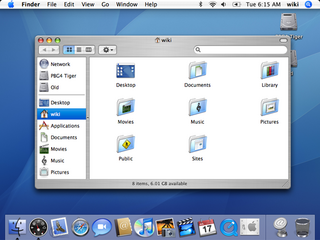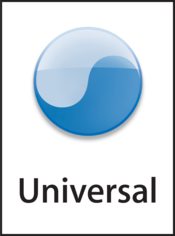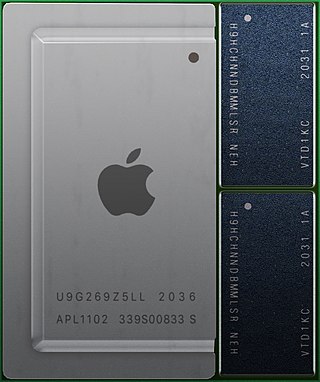
macOS (;), originally Mac OS X, previously shortened as OS X, is an operating system developed and marketed by Apple Inc. since 2001. It is the primary operating system for Apple's Mac computers. Within the market of desktop and laptop computers, it is the second most widely used desktop OS, after Microsoft Windows and ahead of all Linux distributions, including ChromeOS.
Darwin is the core Unix operating system of macOS, iOS, watchOS, tvOS, iPadOS, visionOS, and bridgeOS. It previously existed as an independent open-source operating system, first released by Apple Inc. in 2000. It is composed of code derived from NeXTSTEP, BSD, Mach, and other free software projects' code, as well as code developed by Apple.
In computer architecture, 64-bit integers, memory addresses, or other data units are those that are 64 bits wide. Also, 64-bit central processing units (CPU) and arithmetic logic units (ALU) are those that are based on processor registers, address buses, or data buses of that size. A computer that uses such a processor is a 64-bit computer.
The history of macOS, Apple's current Mac operating system formerly named Mac OS X until 2011 and then OS X until 2016, began with the company's project to replace its "classic" Mac OS. That system, up to and including its final release Mac OS 9, was a direct descendant of the operating system Apple had used in its Mac computers since their introduction in 1984. However, the current macOS is a UNIX operating system built on technology that had been developed at NeXT from the 1980s until Apple purchased the company in early 1997.

Mac OS 9 is the ninth and final major release of Apple's classic Mac OS operating system which was succeeded by Mac OS X 10.0 in 2001, starting the Mac OS X family of operating systems. Introduced on October 23, 1999, it was promoted by Apple as "The Best Internet Operating System Ever", highlighting Sherlock 2’s Internet search capabilities, integration with Apple's free online services known as iTools and improved Open Transport networking. While Mac OS 9 lacks protected memory and full pre-emptive multitasking, lasting improvements include the introduction of an automated Software Update engine and support for multiple users.
Star Trek is the code name that was given to a secret prototype project, running a port of Macintosh System 7 and its applications on Intel-compatible x86 personal computers. The project, starting in February 1992, was conceived in collaboration between Apple Computer, who provided the majority of engineers, and Novell, who at the time was one of the leaders of cross-platform file-servers. The plan was that Novell would market the resulting OS as a challenge to Microsoft Windows, but the project was discontinued in 1993 and never released, although components were reused in other projects. The project was named after the Star Trek science fiction franchise with the slogan "To boldly go where no Mac has gone before".

Mac OS X Tiger is the 5th major release of macOS, Apple's desktop and server operating system for Mac computers. Tiger was released to the public on April 29, 2005 for US$129.95 as the successor to Mac OS X 10.3 Panther. Included features were a fast searching system called Spotlight, a new version of the Safari web browser, Dashboard, a new 'Unified' theme, and improved support for 64-bit addressing on Power Mac G5s. Mac OS X 10.4 Tiger also had a number of additional features that Microsoft had spent several years struggling to add to Windows with acceptable performance, such as fast file searching and improved graphics processing.

A netbook is a small and inexpensive laptop designed primarily as a means of accessing the Internet. Netbooks were sold from 2007 until around 2013, when the widespread advent of smartphones and tablets eclipsed their popularity.

Stevenote is a colloquial term for keynote speeches given by Steve Jobs, former CEO of Apple, at events such as the Apple Worldwide Developers Conference, Macworld Expo, and Apple Expo. Because most Apple product releases were first shown to the public at these keynotes, "Stevenotes" caused substantial swings in Apple's stock price.

Rhapsody is an operating system that was developed by Apple Computer after its purchase of NeXT in the late 1990s. It is the fifth major release of the Mach-based operating system that was developed at NeXT in the late 1980s, previously called OPENSTEP and NEXTSTEP. Rhapsody was targeted to developers for a transition period between the Classic Mac OS and Mac OS X. Rhapsody represented a new and exploratory strategy for Apple, more than an operating system, and runs on x86-based PCs and on Power Macintosh.

Rosetta is a dynamic binary translator developed by Apple Inc. for macOS, an application compatibility layer between different instruction set architectures. It enables a transition to newer hardware, by automatically translating software. The name is a reference to the Rosetta Stone, the artifact which enabled translation of Egyptian hieroglyphs.

The universal binary format is a format for executable files that run natively on either PowerPC or Intel-manufactured IA-32 or Intel 64 or ARM64-based Macintosh computers. The format originated on NeXTStep as "Multi-Architecture Binaries", and the concept is more generally known as a fat binary, as seen on Power Macintosh.

The Mac transition to Intel processors was the process of switching the central processing units (CPUs) of Apple Inc.'s line of Mac and Xserve computers from PowerPC processors over to Intel's x86-64 processors. The change was announced at the 2005 Worldwide Developers Conference (WWDC) by then-Apple CEO Steve Jobs, who said Apple would gradually stop using PowerPC microprocessors supplied by Freescale and IBM.

A tablet computer, commonly shortened to tablet, is a mobile device, typically with a mobile operating system and touchscreen display processing circuitry, and a rechargeable battery in a single, thin and flat package. Tablets, being computers, have similar capabilities, but lack some input/output (I/O) abilities that others have. Modern tablets largely resemble modern smartphones, the only differences being that tablets are relatively larger than smartphones, with screens 7 inches (18 cm) or larger, measured diagonally, and may not support access to a cellular network. Unlike laptops, tablets usually run mobile operating systems, alongside smartphones.
Two major families of Mac operating systems were developed by Apple Inc.

iMac is a family of all-in-one Mac desktop computers designed and built by Apple Inc. It has been the primary part of Apple's consumer desktop offerings since its debut in August 1998, and has evolved through seven distinct forms.
The following outline of Apple Inc. is a topical guide to the products, history, retail stores, corporate acquisitions, and personnel under the purview of the American multinational corporation Apple Inc.

The Mac transition to Apple silicon was the process of switching the central processing units (CPUs) of Apple Inc.'s line of Mac computers from Intel's x86-64 processors over to Apple-designed systems on a chip that use the ARM64 architecture.
Comparison of user features of operating systems refers to a comparison of the general user features of major operating systems in a narrative format. It does not encompass a full exhaustive comparison or description of all technical details of all operating systems. It is a comparison of basic roles and the most prominent features. It also includes the most important features of the operating system's origins, historical development, and role.











